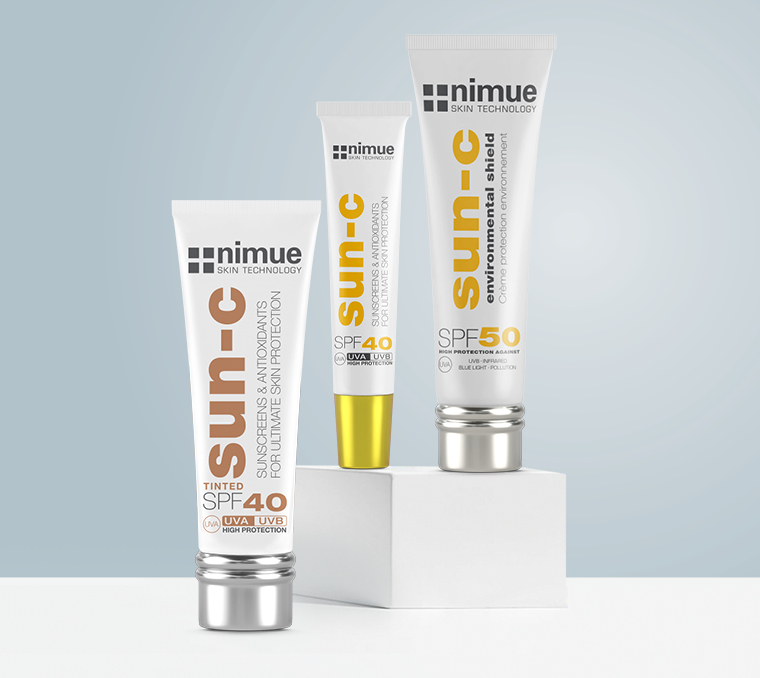Endless days of fun in the sun are good for the soul but can take a toll on your skin. Long summer days spent lounging in the rays are often associated with sun-kissed skin. Fast forward 15 years and the results of those carefree hours of unprotected beach days are presented as sun damaged skin; most prominently on your face, arms, neck and chest.
This is because the sun that we love to bask in for its warmth and excellent source of vitamin D also gives off ultraviolet (UV) light that is harmful to skin and causes sunburn. Over time, exposure to these rays can lead to dark spots, wrinkles and other problem areas. The result of this visible damage to your appearance is that it can make you look older than you are. Dermatologists refer to this phenomenon as photoageing and claim that UV exposure is responsible for up to 80% of your skin’s ageing.
The first and most important step in repairing sun-damaged skin is to prevent any further harm. Dermatologists recommend a good broad-spectrum sunscreen with significant UV protection (at least 40-50 SPF). In addition, some products provide additional blue light and pollution protection. But what can we do about existing damage? Is there a way to repair some of the damage? While it may not be possible to erase all signs of damage, experts have shone a UV-free light on some possible steps to take for these common conditions:
Exfoliating
When skin is sun-damaged, the rate at which skin cells regenerate and replace is slowed, leaving you with dry, dull skin, blemishes, clogged pores and uneven skin tone. A great way to remove layers of these dead skin cells is through exfoliation.
When you exfoliate, you cleanse away cells filled with accumulated brown pigment and simultaneously stimulate the growth of new skin cells, giving you a brighter, smoother, more even look.
There are 3 kinds of exfoliants commonly available: Physical exfoliants, which include tiny granules that scrub away dead skin cells, chemical exfoliants, which dissolve the dead skin cells more gently; and finally, enzymatic exfoliants that assist in breaking down the bonds that glue the cells together.
Enrich your skin with Vitamin A
A popular treatment for reversing sun damage comes from the incredible effects of retinol, a form of retinoid made from vitamin A. It works by boosting the amount of collagen in your skin and stimulating cell turnover.
With regular use over time, it can help smooth and soften fine lines and wrinkles as well as improve skin pigmentation and help fade dark spots. Many dermatologists recommend an over-the-counter cream or serum and they are usually added to your nightly skincare routine, as exposure to the sun renders retinoids inactive.
Anti-ageing Peptides
Peptides are chains of amino acids that are a part of the skin’s natural structure. They are generally added to skincare products due to their ability to stimulate the skin for natural functioning. In a sense, peptides communicate with cells to generate proteins that the skin needs for optimal skin functioning, for example, collagen.
Microneedling
Microneedling is a skincare treatment that involves the stimulation of collagen synthesis, and helps products to be absorbed into the skin more effectively. Stimulating the skin aims to produce more healthy keratinocytes, in turn, increasing cell regeneration. This can be seen as a triple action approach to Nimue’s Microneedling treatment.
Considering Laser/Light Therapy
Topical products in combination with laser/light therapy could be a more effective solution. Various rejuvenation and resurfacing laser therapy works on various levels in the skin to reverse sun damage.
This treatment can improve discolouration, wrinkles, blotchiness, deep skin lines and wrinkles. Because of the nature and intensity of laser therapy, it often goes hand-in hand with a longer recovery period. Speak to your skin rejuvenation therapist if you are considering laser treatment.
Nimue Skin Technology
Nimue’s Sun C is an international award-winning range of sun protection products with an innovative approach that shields the skin from the harmful and premature effects of UV, infrared, blue light and pollution. This range is formulated with a ground-breaking antioxidant to combat photoageing.
Skincare is a science specific to every individual and determining the best solution for you depends on many factors. To get a professional opinion on your skin, visit your nearest salon
